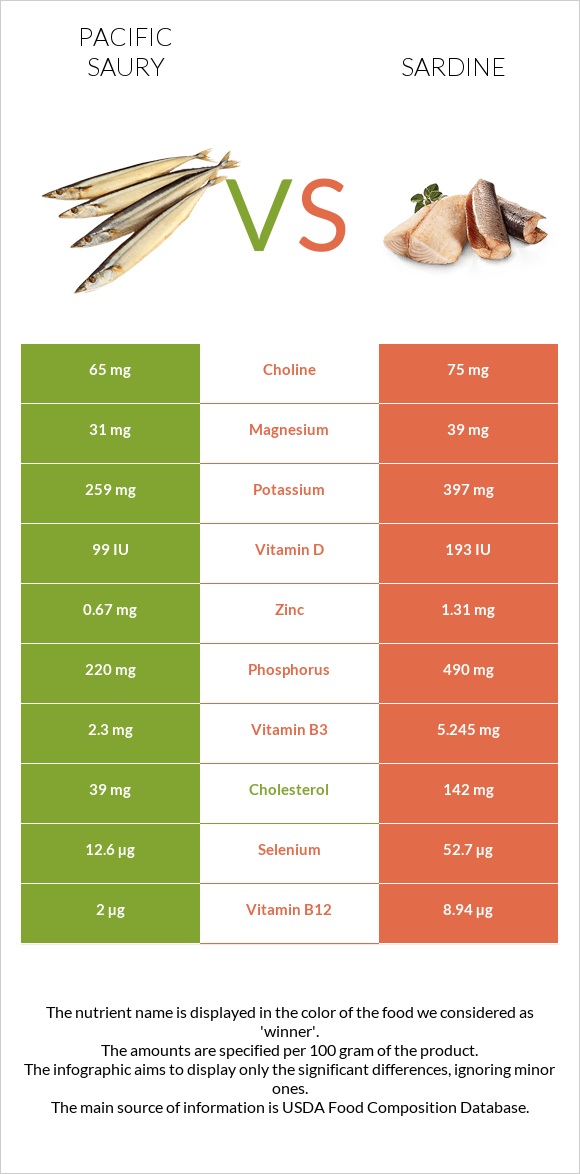Pacific saury vs. Sardines — In-Depth Nutrition Comparison
Compare
Important differences between pacific saury and sardines
- Pacific saury has more manganese and vitamin B1; however, sardines have more vitamin B12, selenium, phosphorus, calcium, iron, and vitamin B3.
- Sardines' daily need coverage for vitamin B12 is 276% more.
- Pacific saury has 10 times more manganese than sardines. Pacific saury has 1.026mg of manganese, while sardines have 0.108mg.
- Pacific saury is lower in cholesterol.
The food varieties used in the comparison are Fish, pike, walleye, cooked, dry heat and Fish, sardine, Atlantic, canned in oil, drained solids with bone.
Infographic

Infographic link
Mineral Comparison
Mineral comparison score is based on the number of minerals by which one or the other food is richer. The "coverage" charts below show how much of the daily needs can be covered by 300 grams of the food.
| Contains more PotassiumPotassium | +25.7% |
| Contains more CopperCopper | +22.6% |
| Contains less SodiumSodium | -78.8% |
| Contains more ManganeseManganese | +850% |
| Contains more CalciumCalcium | +170.9% |
| Contains more IronIron | +74.9% |
| Contains more ZincZinc | +65.8% |
| Contains more PhosphorusPhosphorus | +82.2% |
| Contains more SeleniumSelenium | +225.3% |
Vitamin Comparison
Vitamin comparison score is based on the number of vitamins by which one or the other food is richer. The "coverage" charts below show how much of the daily needs can be covered by 300 grams of the food.
| Contains more Vitamin B1Vitamin B1 | +290% |
| Contains more Vitamin B5Vitamin B5 | +34.7% |
| Contains more FolateFolate | +70% |
| Contains more Vitamin AVitamin A | +33.3% |
| Contains more Vitamin B2Vitamin B2 | +16.4% |
| Contains more Vitamin B3Vitamin B3 | +87.3% |
| Contains more Vitamin B6Vitamin B6 | +21% |
| Contains more Vitamin B12Vitamin B12 | +287% |
All nutrients comparison - raw data values
| Nutrient |  |
 |
DV% diff. |
| Vitamin B12 | 2.31µg | 8.94µg | 276% |
| Selenium | 16.2µg | 52.7µg | 66% |
| Manganese | 1.026mg | 0.108mg | 40% |
| Phosphorus | 269mg | 490mg | 32% |
| Polyunsaturated fat | 0.573g | 5.148g | 31% |
| Vitamin D | 193 IU | 24% | |
| Calcium | 141mg | 382mg | 24% |
| Vitamin D | 4.8µg | 24% | |
| Vitamin B1 | 0.312mg | 0.08mg | 19% |
| Iron | 1.67mg | 2.92mg | 16% |
| Fats | 1.56g | 11.45g | 15% |
| Vitamin B3 | 2.801mg | 5.245mg | 15% |
| Vitamin E | 2.04mg | 14% | |
| Choline | 75mg | 14% | |
| Cholesterol | 110mg | 142mg | 11% |
| Sodium | 65mg | 307mg | 11% |
| Monounsaturated fat | 0.377g | 3.869g | 9% |
| Copper | 0.228mg | 0.186mg | 5% |
| Zinc | 0.79mg | 1.31mg | 5% |
| Saturated fat | 0.319g | 1.528g | 5% |
| Calories | 119kcal | 208kcal | 4% |
| Vitamin B5 | 0.865mg | 0.642mg | 4% |
| Potassium | 499mg | 397mg | 3% |
| Vitamin B2 | 0.195mg | 0.227mg | 2% |
| Vitamin B6 | 0.138mg | 0.167mg | 2% |
| Vitamin K | 2.6µg | 2% | |
| Folate | 17µg | 10µg | 2% |
| Vitamin A | 24µg | 32µg | 1% |
| Protein | 24.54g | 24.62g | 0% |
| Magnesium | 38mg | 39mg | 0% |
| Tryptophan | 0.275mg | 0.276mg | 0% |
| Threonine | 1.076mg | 1.079mg | 0% |
| Isoleucine | 1.131mg | 1.134mg | 0% |
| Leucine | 1.994mg | 2.001mg | 0% |
| Lysine | 2.254mg | 2.26mg | 0% |
| Methionine | 0.726mg | 0.729mg | 0% |
| Phenylalanine | 0.958mg | 0.961mg | 0% |
| Valine | 1.264mg | 1.268mg | 0% |
| Histidine | 0.722mg | 0.725mg | 0% |
| Omega-3 - EPA | 0.11g | 0.473g | N/A |
| Omega-3 - DHA | 0.288g | 0.509g | N/A |
| Omega-3 - DPA | 0.049g | 0g | N/A |
Macronutrient Comparison
Macronutrient breakdown side-by-side comparison
Protein:
24.54 g
Fats:
1.56 g
Carbs:
0 g
Water:
73.47 g
Other:
0.43 g
Protein:
24.62 g
Fats:
11.45 g
Carbs:
0 g
Water:
59.61 g
Other:
4.32 g
| Contains more WaterWater | +23.3% |
| Contains more FatsFats | +634% |
| Contains more OtherOther | +904.7% |
~equal in
Protein
~24.62g
~equal in
Carbs
~0g
Fat Type Comparison
Fat type breakdown side-by-side comparison
Saturated fat:
Sat. Fat
0.319 g
Monounsaturated fat:
Mono. Fat
0.377 g
Polyunsaturated fat:
Poly. Fat
0.573 g
Saturated fat:
Sat. Fat
1.528 g
Monounsaturated fat:
Mono. Fat
3.869 g
Polyunsaturated fat:
Poly. Fat
5.148 g
| Contains less Sat. FatSaturated fat | -79.1% |
| Contains more Mono. FatMonounsaturated fat | +926.3% |
| Contains more Poly. FatPolyunsaturated fat | +798.4% |




